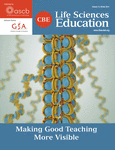Undergraduates Achieve Learning Gains in Plant Genetics through Peer Teaching of Secondary Students
Abstract
This study tests the hypothesis that undergraduates who peer teach genetics will have greater understanding of genetic and molecular biology concepts as a result of their teaching experiences. Undergraduates enrolled in a non–majors biology course participated in a service-learning program in which they led middle school (MS) or high school (HS) students through a case study curriculum to discover the cause of a green tomato variant. The curriculum explored plant reproduction and genetic principles, highlighting variation in heirloom tomato fruits to reinforce the concept of the genetic basis of phenotypic variation. HS students were taught additional activities related to molecular biology techniques not included in the MS curriculum. We measured undergraduates’ learning outcomes using pre/postteaching content assessments and the course final exam. Undergraduates showed significant gains in understanding of topics related to the curriculum they taught, compared with other course content, on both types of assessments. Undergraduates who taught HS students scored higher on questions specific to the HS curriculum compared with undergraduates who taught MS students, despite identical lecture content, on both types of assessments. These results indicate the positive effect of service-learning peer-teaching experiences on undergraduates’ content knowledge, even for non–science major students.



